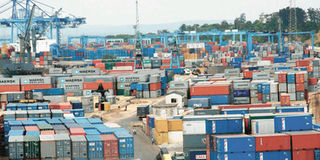Breaking News: Old Kijabe dam tragedy: Death toll rises to 45
Avoid container deposit to cut cost of doing business

Containers at the port of Mombasa.
Shipping containers are critical freight transport assets. To safeguard their commercial interests, shipping lines, which own the containers, require a cash deposit before releasing them. This serves as security for the return of the boxes by shippers or clearing agents in good time and condition.
However, the practice has, over the years, been flagged by private and public sector players alike as a major trade barrier. The deposits impose a huge financial burden to clearing agents by idling resources, resulting in cash flow challenges.
Container deposits range between $500 (Sh70,000) and $2,000 (Sh280,000) per twenty-foot equivalent empty unit (TEU) but could be more for other types. The deposit amount is determined by geographical location, market demand and type and size of the container.
The deposits, estimated at a staggering $1.5 billion (Sh210 billion) annually in East Africa, have contributed to the region’s transport corridors ranking poorly in terms of the cost of doing business. Notably, these extra costs are passed on to consumers, increasing the cost of living.
Importers and exporters using the Port of Mombasa should be encouraged to embrace the available alternatives to container deposits. For instance, the globally recognised Viaservice Container Solution (VCS) is now available in Kenya.
The solution frees up huge amounts of capital held by shipping lines in the form of cash deposits for containers, improving port efficiency. It enables a waiver of container deposit while ensuring prompt settlement of related charges to shipping lines.
This comes in the wake of growing competition between the ports of Mombasa, which serves the Northern Corridor, and Tanzania's Dar es Salaam that caters for the Central Corridor. Instructively, since Dar adopted the novel option in 2019, it has seen an uptake of 65 per cent clearing agents.
Container deposit has been a major issue of concern and is among the several non-tariff barriers (NTBs) to trade in the region. When imports reach Mombasa, the owners may not have the money to put up a container deposit, leading to delays in cargo clearance.
An alternative provides a sustainable and business-friendly solution to the perennial NTB menace and lowers the overall cost of doing business, leading to trade competitiveness.
In April 2016, the 13th Northern Corridor Integration Project Heads of State Summit directed finance and trade ministers to ensure shipping lines and insurance companies signed agreements on elimination of cash deposits for containers. But that failed as the proposed insurance solutions failed to sustainably address some of the commercial concerns.
By freeing up capital held in container deposits, businesses can invest more in their operations, create jobs and become more competitive. It also reduces the dwell time of containers at the port and inland depots, which improves efficiency and reduces congestion at the port.
- Mr Kihara, a communication consultant on shipping and logistics, is a former Nation Media Group reporter. [email protected].





